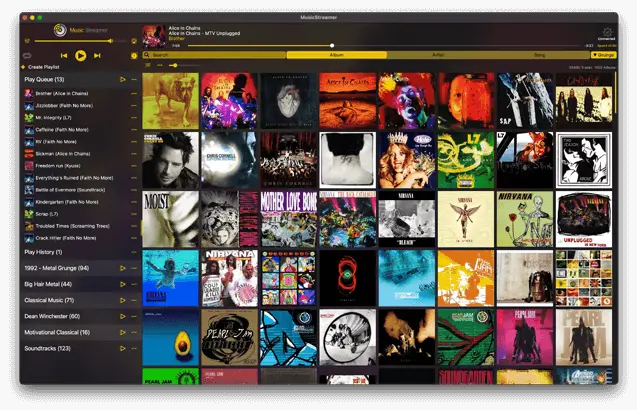FileBrowser Pro for Mac UserGuide
Follow Our Simple macOS Step by Step Guides
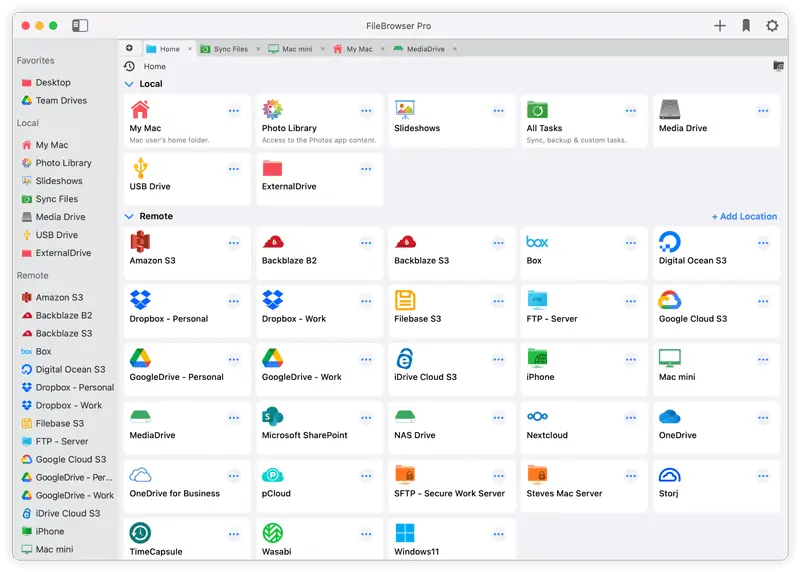
Set your Home Folder
Simply click "My Mac" on the home screen, select your home folder on your Mac and click "Open".
You can re-link this by clicking the Actions menu on the "My Mac" location on your home screen and selecting "Unlink".
Connect to Other Computers and Drives
Add other locations such as network drives, USB, other computers or your cloud storage, by simply clicking "Add Location" from the home screen and follow the setup wizard.
FileBrowser Pro for Mac has an integrated SMB, FTP and WebDAV client.For more specific help on getting connected see the following guides:
SMB 1, 2 & 3
WebDAV
FTP, FTPS & SFTP

Synology NAS
QNAP NAS
Connect to your Cloud Storage
Select one of our connection guides below:
Using Tabs in FileBrowser Pro for Mac
Having multiple Tabs open can speed up your productivity. Simply copy files from one tab to another.
Create a new Tab by clicking the "+" icon next to the first Tab and browse any of your storage locations.
You can even drag and drop files between your open Tabs.
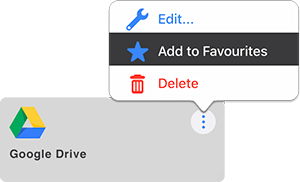
Add Favourites to your Home Screen
Add your Favourite locations to the top of the Home Screen, speeding up your workflow. Drag Favourites to re-order them.

Create a New Window
Open as many FileBrowser Pro windows as you like simply hold down "CMD" and press "n" for a new window.
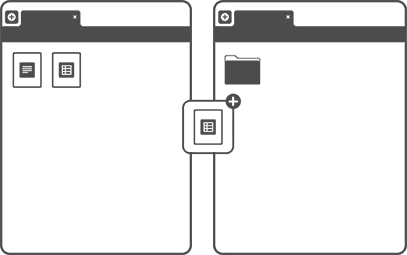
Drag and Drop Files Between Windows
Single File Drag Drop
Click and drag a file into another FileBrowser Pro window, tab or into Finder on your Mac.
Drag Drop Multiple Files
Click "Select" in the top right corner to enter multi-select mode. Click cells to select them or click the check marks to multi select. Use shift-click to select a range of files. Then drag one of the selected files into either a new window or tab. See the Multi-select section.
If you drag files to somewhere on the same location you will move the files.
If you drag files to another location the files will be copied.
Folder View Options
FileBrowser Pro for Mac remembers the View mode, Sort order and even Zoom level, per folder. Perfect for Photos or Files.
List
Single column showing file details.
Grid
Grid of icons or image thumbnails with file details.
Grid No Borders
Grid of icons or image thumbnails with no file details.
Columns
Two or three columns showing file details.
Gallery
Large preview, with menu off to the side.
In Grid and List view use the pinch gesture to zoom the thumbnails, this can also be done via the slider in the sort menu.
Sort
Sort by one of the options below in either ascending or descending order, you can also sort folders first.
- Sort by Name
- Sort Alphabetically
- Sort Folders First
- Sort by Date
- Sort by Size
- Sort by Type
- Sort by Rating
File Actions Menu
Simply right click a folder or file to access the file actions menu.
View in Quicklook
Preview the selected file and allow it to be launched by your editor application.
View / Edit in...
Open the document in its editor.
Get Folder Info
This displays a popup showing a summary of file & folder size and content categories.
Markup / Print
This views files using an alternate viewer with annotation features. clicking the menu button in this mode allows you to print your document.
Open as Text
Open the file and treat it as containing only text.
Copy
Copy a file.
How to use multiple select
Move
Move a file to selected folder.
Duplicate
Make a duplicate of the current file.
Rename
Rename the file or bulk rename multiple files.
How to use bulk rename
Delete
Delete a file or folder.
Share
Share your file to another app, including AirDrop, Mail, Messages etc.
Show in Finder
Show the current file in macOS Finder.
Google Drive Share
If you have shared a folder from Google Drive you can manage that list here.
Export to Finder
Export a file to a folder of another app.
Export a Folder to Finder
Zip this Folder
Create a Zip file of the selected folder.
Or in multi select mode, if you have several files selected, you can also create a zip file.
Create PDF
Convert an Image into a PDF file.
Create PDF
Queue Audio
Add a music track to the now playing list.
Create Slideshow
Create a slideshow from the selected folder.
How to Create a Slideshow on Mac
Open in New Tab
Open the current file in a new FileBrowser Tab.
Open in New Window
Open the current file in a seperate FileBrowser Window.
Create a Sync Task
Setup a Sync Task to copy files and folders to Filebrowser Pro.
How to Sync Files on Mac
Create a Backup Task
Setup a Backup Task to copy files or folders from one destination to another.
How to Backup Files on Mac
Run a Custom Task
Run a pre-built Custom Task.
See Custom Tasks.
Create a File Link
Create a server path link for SMB or FTP servers.
Create file links that you can email or paste into a folder.
Add a Bookmark
Add a Bookmark link to the current file.
Read more about Bookmarks.
Add to Favourites
Add the current folder to the favourites section on the homepage.

USB Drives
Simply plug in your USB drive and follow the instructions below:
From FileBrowser Pro's Home screen click "Add Location"
Then click "USB Drive"
From here, click "Select Location" and select your USB device.
You can also rename it, at this point, click "Save" and thats it.
You can add multiple USB drives and FileBrowser Pro for Mac will remember them.
Import from Finder
Easily Import files from finder to remote locations such as Google Drive or a Windows PC.
In the folder you want to Import the file into, click "Import from Finder" from the toolbar menu icon and finder will appear.
Select the file you wish to Import and it will be copied to the current folder.
Export to Finder
Easily export a file or folder to finder using the steps below:
Click "Export to Finder" from the file menu icon and navigate to the macOS folder.
Tap "Save" to export the file or folder to that location.
Multi File Select Mode
Multi-file select isn't just for copying or deleting files. You can also use it for Bulk Renaming, zipping files, running Custom Tasks or creating PDFs.
Step 1
Click and hold a file or a folder to enter multi select mode or click the "Select" button on the top toolbar.
Step 2
Then select additional files and or folders by holding down "CMD" and left clicking each item. Or select individual files by clicking the check circle.
You can also select groups of files by clicking the first file then hold down "Shift" and left click the last file, all files in between become selected.
Step 3
Then click "Copy" or click the toolbar to access more options such as Rename, Share, Create Zip and Email attachments.
- Cancel multi-selection mode, press "Esc" or click the "Cancel" button.
- To complete a copy or move, navigate to where you want your files or folders to be and click the toolbar button "Paste X files here...".
How to Bulk Rename Files on Mac
Let's show you how to rename hundreds of files at once on your Mac or in the Cloud, with our advanced bulk rename tools its never been easier.
Add Text to Multiple Files at Once on Mac
Add text to the beginning or the end of all the selected files. For example "Presentation_Filename.pdf" or "Filename_Presentation.pdf".
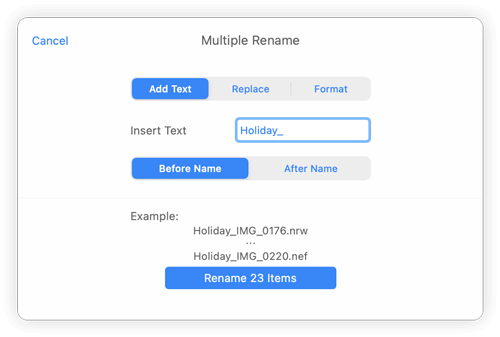
Find and Replace Text on Multiple Files on Mac
Find and replace words within your file names. For example you could bulk rename all ".jpeg" files to ".jpg" files or replace "_DCS" as the prefix for all your files and change it to "IMG_".
This method would preserve existing image numbers in the filename.
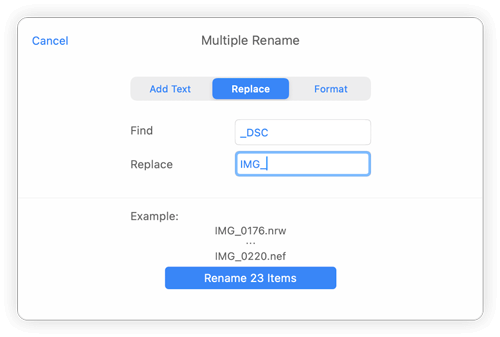
Add a Custom Format to Multiple Files on Mac
Add an Index, a Counter or a Date before or after your existing filenames by leaving the Custom Format box empty. For example:
- "IMG_0.jpg" Index
- "IMG_0000.jpg" Counter
- "IMG_2018-09-27 at 15.46.36.jpg" Date
If you use the Custom Format box, existing file names will be replaced with the text. For example if you want to rename all your photos that were previously something like this:
- "IMG_0156.JPG"
- "_DSC0267543.JPG"
- "Family_Holiday_9342.JPG"
You can rename them all to be "Holiday_(date).JPG", replacing any names they previously had.
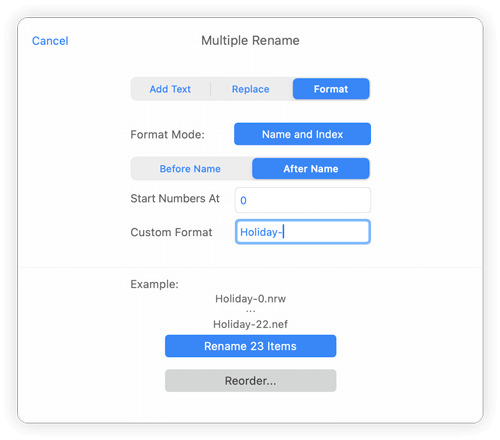
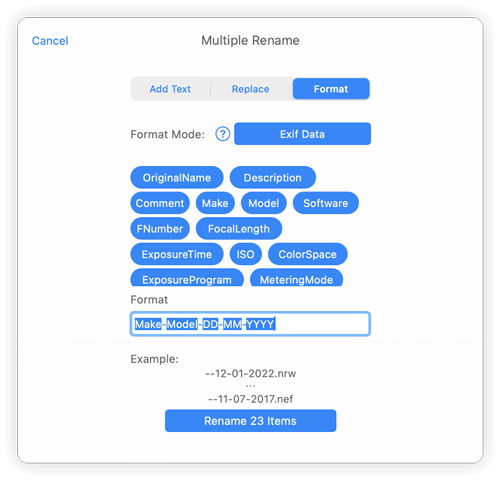
Rename Photos Using their EXIF Properties
Add EXIF Properties to your filenames, such as Make, Model, Description or Comment. You can also incorporate a date in any format. These options are great for professional photographers. For Example:
- Nikon-D850-ISO-200-08-12-2024
- DSC203452-2024-12-08
- Bright Sunset Rome-2024-12-08
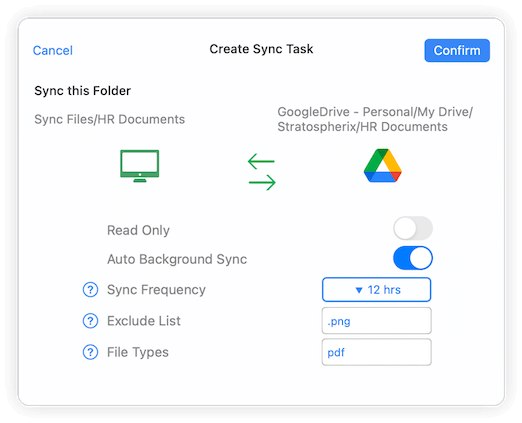
Create Sync Tasks on macOS
Sync files and entire folders from any location (computers, servers or the cloud) directly to FileBrowser Pro on your Mac. To create a Sync Task follow these steps:
Step 1
Right click a folder or file and on the context menu select "Create Sync Task"
Step 2
Set the Sync Frequency you want the file or folder synced to your Mac
Exclude list: you can exclude files or folders with matching text. Example: "data" would exclude "data.jpg" and "data.txt" or ".doc" would exclude all doc files.
File Types: include only files matching these file types. For example: "jpg,jpeg,png,tiff"
Once set, tap "Confirm". The content will be downloaded to FileBrowser Pro under the new location 'All Tasks' on the home screen.
This location is not accessible outside of FileBrowser Pro.You may set up as many Sync Tasks as you wish.
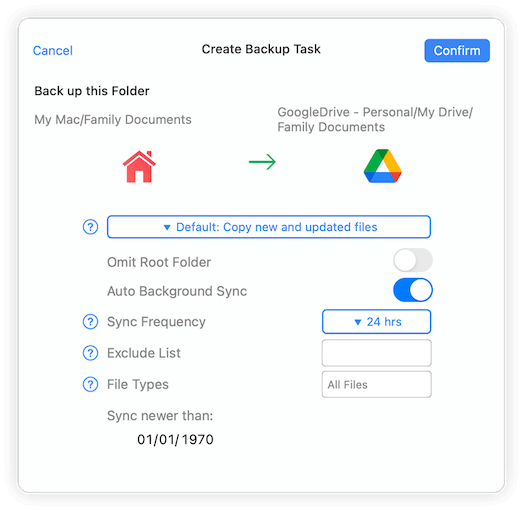
Create Backup Tasks on macOS
Create a Backup Task to Backup files and folders from one location to another, including your computer, network drive or cloud storage.
Follow these steps:
Step 1
Right click a folder or file and select "Create Backup Task" on the context menu.
Step 2
Navigate to the location you want to back up the selected file to.
Step 3
Once in the correct folder, click the "Backup to (Your folder)" option at the top of the dialog. Then click the "Confirm" button.
You can check on your Backed up files under the "All Tasks" section on the home screen.
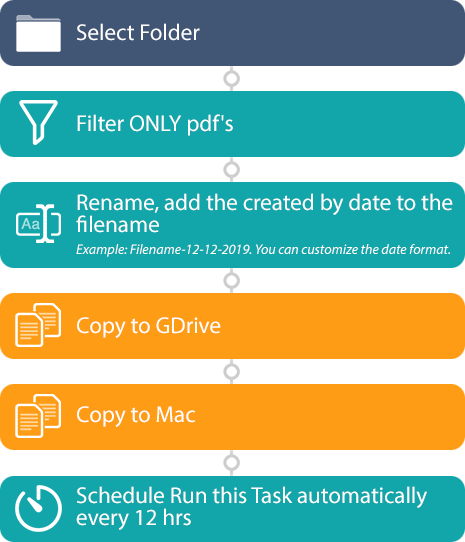
Create Custom Tasks
Create file based workflows to speed up your daily tasks.
Step 1
To create a new Custom Task tap the "All Tasks" location on the home screen.
Step 2
Then select the "custom" tab
Step 3
Tap the plus icon in the top toolbar and select "Create Custom Task". Then use our custom task builder to create your task.
Custom Tasks can be as simple or as complex as you like.
Search
Search folders for files
Navigate to the location or folder you want to search, then click the "Search" icon on the top toolbar.
Type in the box at the top of the screen.
Press "Enter" on the keyboard and you will be asked if you want to search this folder only or all sub folders.

Google Drive Searching
Searching on Google Drive not only searches file names but also file contents, making finding your documents a breeze.
Advanced macOS Search

Filter macOS file searches using custom date ranges, file types and sizes or use Regex search text. You can save and load searches too.
To use a Regex search, toggle the switch and type your regular expression into the main search box.
Step 1
Tap the search icon in the top toolbar.
Step 2
Then select the advanced icon (settings sliders) to expand all the advanced options.

Bookmarks
Bookmarks are a great feature of FileBrowser Pro. You can use them in two ways: Folder Bookmarks & Document Bookmarks.
Folder Bookmarks
If you have folders on your computer that you use all the time such as My Documents, Photo Library or Movies, create a bookmark to them. These will become your shortcuts and save you time navigating through folders to get to where you want.
Create a Bookmark
Click the Bookmark icon and click the + icon.
You can give it a more memorable name then click add.
Open a Bookmark
Click the Bookmark icon and your existing Bookmarks are listed.
Just select one and FileBrowser Pro will connect and browse to the Bookmarked folder.
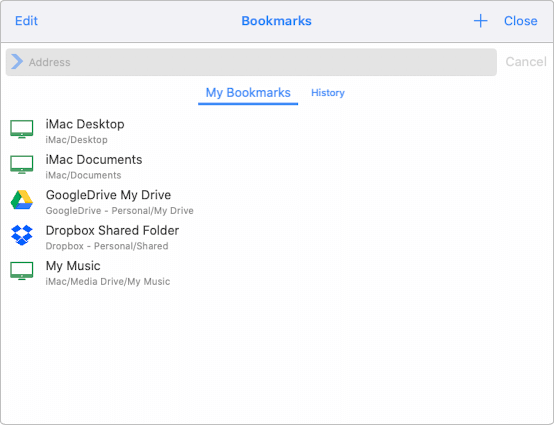
Document Bookmarks
If you are reading a long PDF, whether it's a book or a presentation or a legal document, add a bookmark. When you click that bookmark, FileBrowser Pro will remember the location in the file and open it where you left off.
From this page you can add a Bookmark:
Click the Bookmark icon in the toolbar
Then click '+', for rapid navigation to this file next time.
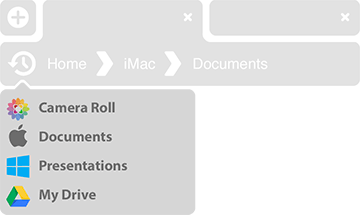
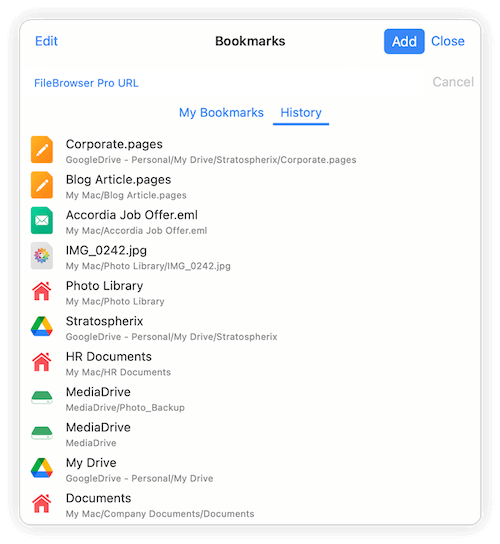
You can also view your History in the Bookmarks menu. From here you can clear individual items or clear your entire history.
- Tap the Bookmarks icon in the top toolbar
- Select the "History" tab.
- Tap "Edit" and clear individual files or folders. To clear your entire History tap "Clear History".
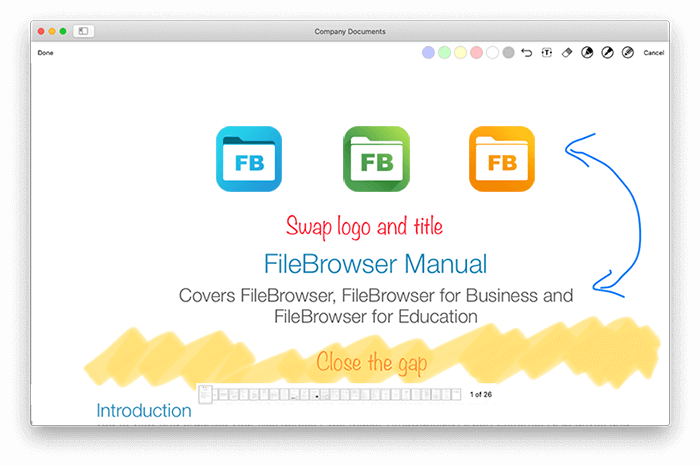
PDF and Image Annotation
Annotate your PDFs to make comments, highlight text and use the drawing tools. Once you have finished annotating your document or image FileBrowser will save the new file and keep the original as a backup.
- Right click a file and select "Markup File/Print" on the file context menu.
- Click the annotate icon in the top right, this will display the annotation menu.
- You have the following tools:
- Pen
- Pencil
- Eraser
- Text
- Highlighter
- After you have finished annotating your photo or PDF simply click "Done" Then "Close".
- You will be prompted to save the file with a another name, so it wont overwrite your original.
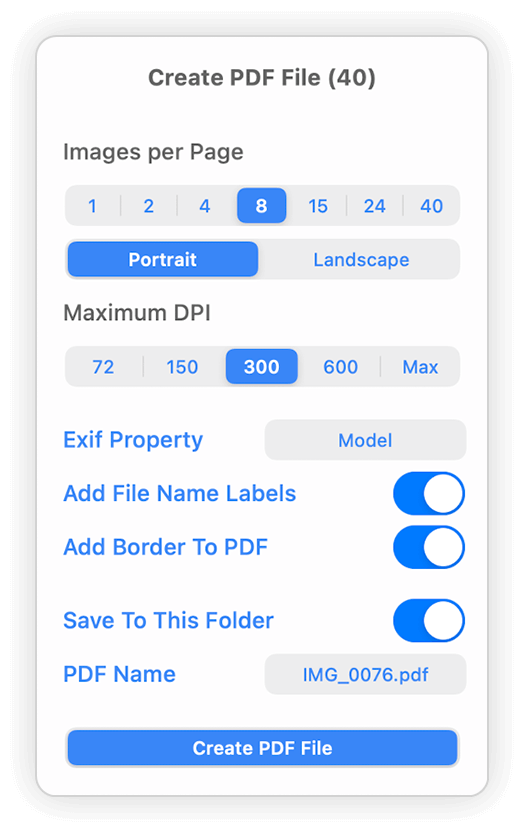
Create PDF
You can select a combination of images or PDF files to merge or create one PDF.
Save Image as PDF
- Select the context menu on an image file then select "Create PDF File"
- This will convert a single image into a PDF file
Merge PDFs
- Select multiple PDFs in a folder and then tap the menu icon (top right). Select "Merge PDFs".
- Tap "Merge PDFs" and the new PDF will be saved into the current folder. You can save the PDF to another location by unchecking "Save to this Folder" and the file will be copied to your clipboard.
Create Multi-Page PDFs from Photos
- Select multiple images in a folder and then tap the menu icon (top right). Select "Create PDF File".
- Select the number of images you want per page.
- Select your paper orientation, portrait or landscape.
- Choose the quality by selecting DPI.
- Optionally choose an Exif property to add to your file labels.
- You can also add the filenames underneath each image for easy reference.
- Tap "Create PDF File" and the new PDF will be saved into the current folder. If you want to save the PDF to another location uncheck "Save to this Folder" and the file will be copied to your clipboard.
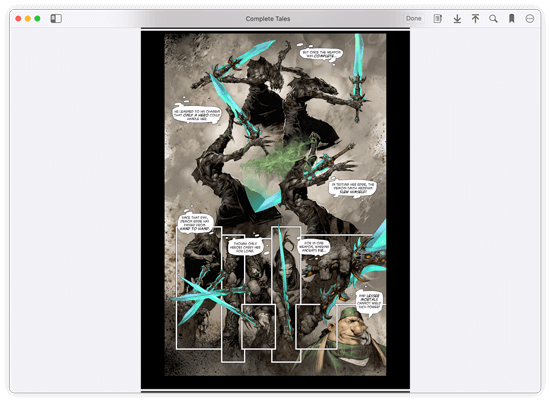
Comicbook Viewing
View your comics collection stored in CBR or CBZ files. View images within any ZIP or RAR file.
Simply click the comic file and FileBrowser Pro will open it in the comic viewer.
Just use the left and right arrow keys to turn the pages.
Tap "Done" to exit the comic viewer.
Create Slideshows on Mac
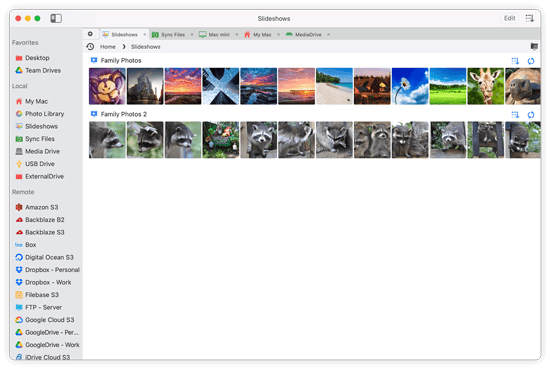
Create slideshows and save them for later use. Access them from FileBrowser Pro's home screen of the app, simply select "Slideshows".
To create a Slideshow do the following either:
- Right click a folder and select "Create Slideshow" on the context menu.
This will create a slideshow of all the images inside that folder and its subfolders.
- Select multiple images, then click the Toolbar Actions menu and select "Create Slideshow".
This will create a new Slideshow with only the images you have selected.
To change the delay, transitions and order in the Image Viewer click the Actions Menu and select "Slideshow Settings".
Image Properties
Display your image properties (EXIF data) such as dimensions, color mode, latitude, camera model etc.
Markup
Annotate your images with markers or text tools, then you can save it as a new file.
Rotate Image
Rotate the current image left or right.
Convert
Convert image into JPG, HEIC or TIFF format.
Slideshow Settings
Change delays and transitions.
How to Change Slideshow Settings on Mac
Share...
Share your file via mail, AirDrop, or iMessage etc.
Refresh
Refresh the current view.
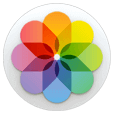
Browse your Mac Photos Library
You can access the photos in the Mac Photo app. Click the "Photo Library" location.
Selecting Multiple Images
Select multiple images in the image view by clicking the Tick icon in the toolbar. Selecting them turns the tick green like the screenshot. When you have finished cick "Done" you will be returned to the folder view in select mode where you can choose to copy, move, delete, or share those images.
Zoom
When in the image viewer, use pinch to Zoom. A double click will set the zoom level back to its original size.
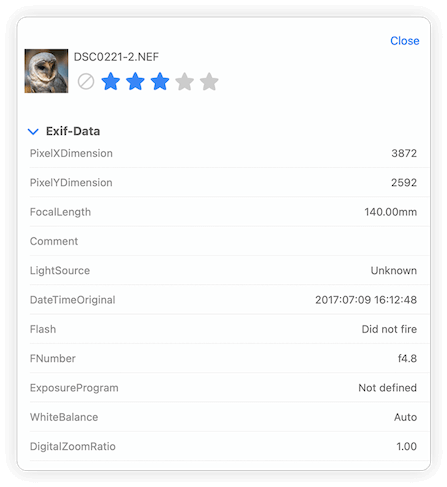
Tag Your Photos with XMP on Mac
Update or create new XMP sidecar files for images and rapidly update rejection and star rate your photos.
Step 1
Select an image to enter full screen mode, then click the 'i' information icon in the top toolbar.
Step 2
You can star rate or reject your photos using the icons in the top of the information panel.
You can also check all your EXIF data to your photographs such as Exposure time, shutter speed etc.
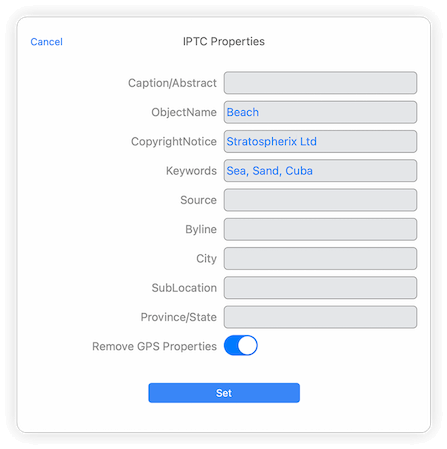
IPTC
IPTC Photo Metadata tags allow you to describe photos using metadata properties. You can add precise and reliable data about your photos, such as copyright, source, location.
You can edit IPTC on multiple photos at once using Custom Tasks.
To edit IPTC on a single file, follow the steps below:
Step 1
Select an image to enter full screen mode, then click the 'i' information icon in the top toolbar.
Step 2
Click the "Edit" button top right to view your IPTC Properties.
Step 3
Here you can edit your IPTC information for the current photo.
Not all photos support IPTC Metadata.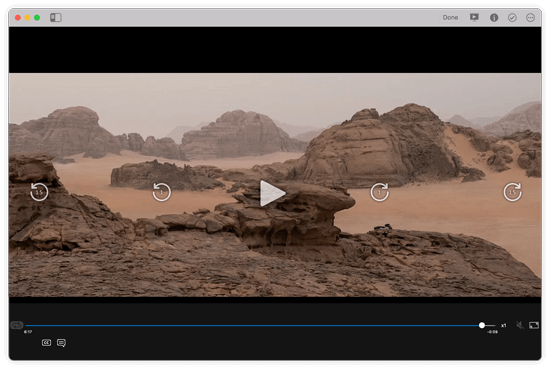
Playing Movies
Simply click the Movie file you want to play and it will auto start, click in the center of the screen to pause the video. Once paused you can click anywhere on the screen to bring up the additional controls.
Subtitle Support
If your movies have embedded subtitles, simply select the ones you want to display.
Video Language Support
If your movies have embedded audio languages, simply select one from the list.
Supported video formats
FileBrowser can play all video formats supported by Apple, including the following:
- MP4
- MOV
- M4V
- 3GP
- 3G2
- AVI
DRM Protected Movies from iTunes
Apple prevent movies purchased from iTunes being streamed to non-Apple apps.
Play Music
FileBrowser can play most music file types including Hi-Res FLAC. Featuring several play modes including:
Album Mode
Play selected track and the remaining ones in the folder.
Single Mode
Selecting a track from a folder queues and plays it once.
Repeat Mode
Play selected track and all others in the folder continuously.
Shuffle Mode
Play selected track and others in the folder randomly.
Queue Tracks
You can play queue tracks to play by pressing the context menu on a track and select "Queue Audio". This will place it in the now playing queue.
Edit Track Order
Re-order queued tracks, Simply click "Edit", then drag the tracks into the order you want and click "Done".
Podcasts & Audiobooks
- You can rewind or fast forward 15 secs at a time
- Speed Up and slow down track playback. Great for audiobooks.


